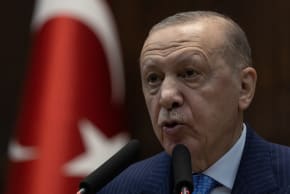Recep Tayyip Erdogan
Crisis-driver or Gaza stabilizer? Why Turkey believes it switched roles with Israel - analysis
Ankara feels that from the Horn of Africa to the Eastern Mediterranean and Syria and Iraq it has increased its influence greatly in the last years.


Journalist for German media detained in Turkey for 'misinformation,' 'insulting president'

US Senator Lindsey Graham visits UAE President in Abu Dhabi

Turkey could join nuclear arms race if Iran acquires bomb, Hakan Fidan warns
Turkey deepens role in Gaza’s 'Day After' through contacts with Hamas
An examination of the sequence of events and official statements indicates that Turkey is working to advance a framework in which Hamas would be recognized in any future Palestinian arrangement.

Erdogan: Turkey working hard to prevent new Middle East war over US-Iran tensions
Speaking to reporters on a return flight from a visit to Egypt, Erdogan added that talks at the level of the US and Iranian leadership would be helpful after lower-level nuclear negotiations.

Erdogan arrives in Cairo after Riyadh talks, raising concerns in Israel - analysis
Turkish President expected to discuss regional developments, including Gaza and Libya.

From rivals to partners: What does Erdogan’s Saudi visit mean for the Middle East? - analysis
Saudi Arabia welcomed Erdogan for talks highlighting closer Ankara-Riyadh ties as the kingdom reconsiders its regional priorities.

Israeli woman arrested in Turkey on charges of anti-Palestinian rhetoric, denouncing Erdogan
The Foreign Ministry confirmed that it was aware of an Israeli citizen who was detained in Istanbul. N12 reported she has been held for 10 days.

Experts warn of Turkey’s role in Gaza after study finds antisemitism, Hamas support in media
Analyzing approximately 15,000 opinion columns in the widely read newspapers Sabah and Hürriyet, JPPI found that descriptions of Hamas often rely on the “resistance movement” narrative.

Turkey deploys advanced radar at Damascus airport, raising Israeli concerns
Turkey deployed an advanced radar system at Damascus International Airport, a move Western sources warn could restrict Israel’s freedom of action in Syrian airspace and heighten regional tensions.

As Israel pushes back, Gaza becomes testing ground for emerging post-war governance - analysis
The emergence of a Palestinian technocratic governing committee alongside Trump’s US-backed Board of Peace has triggered sharp Israeli backlash, exposing cabinet rifts and deep unease.

Netanyahu ushered Turkey, Qatar through Gaza's front door, ex-PM Naftali Bennett charges
“Erdogan and the despicable Qatar, the greatest haters of Israel, the most enthusiastic aides of Hamas, are being ushered in through the front door to run Gaza,” Bennett wrote on X/Twitter.

Erdogan, Sharaa discuss Syria as SDF confirms withdrawal following ceasefire
Turkey’s President Erdogan spoke with Syrian President Sharaa after a deal with Kurdish forces, as SDF leader Mazloum Abdi confirmed a military withdrawal, and plans to visit Damascus.
